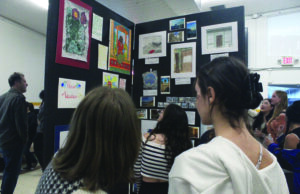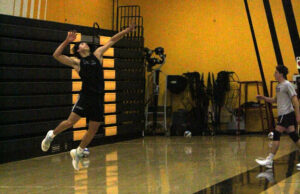Local community supports LGBTQ+ youth
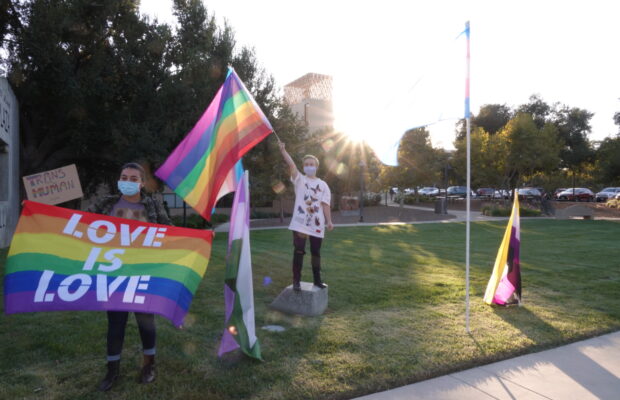
The fight for LGBTQ+ rights has made great progress in the 21st century, including the nationwide legalization of same-sex marriage in 2015 and anti-discrimination laws aiming to provide the same job opportunities to all Americans. Although legislation has been passed, there is still much work left to do in the normalization and acceptance of LGBTQ+ people in our communities. On the local level, many groups and organizations exist within the Conejo Valley who are working to both create a more inclusive environment for LGBTQ+ youth in schools as well as in the community.
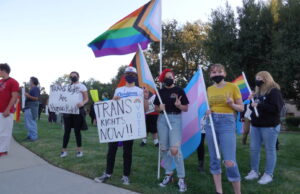
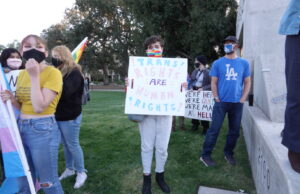
Trans Rights Rally
Even through a pandemic, the LGBTQ+ community continues to fight for their rights. On Oct. 28, a transgender rights rally was held by NPHS student Remi Parise, a queer and non-binary freshman (they/them). Parise felt that the rally was necessary given the current political climate.
A large discussion currently affecting the transgender community is the debate on whether or not to include gender identity education in CVUSD elementary schools. “I don’t think [the LGBTQ+ community] is talked about as much as it needs to be in school. They should teach about LGBTQ+ history and sex education, and stuff like that which they don’t,” Parise said. “They should teach classes specifically…for trans people on how to be safe and not hurt themselves by doing unsafe things.”
Finn Swanson, sophomore at Thousand Oaks High School (he/him), attended the rally and was pleasantly surprised at how many people came to show their support. “As a trans person, I really haven’t seen very much support from the community, especially since there’s so many struggles we face in getting better education…I didn’t come here expecting this big of a crowd. It’s really inspiring and nice to see so many people out here to support trans people,” Swanson said.
“I think that it should be easier for them to transition since that’s very hard in this society,” Zoey Blair, freshman (she/her), said. Major issues advocated by supporters like Blair are rights such as healthcare for the transgender community. “I think the most important part is that they’re humans, and they deserve the basic level of respect that every human deserves, and taking away something like healthcare is just a terrible thing to do to anyone,” Blair said.
These debates also tie into the current elections, where the rights of some communities are at risk “Really just the political climate,” Parise said, “because there’s a lot of hate right now against certain communities and I don’t think it should be that way and I want to make people aware that, you know, we’re people, and we need you know the same rights that everyone else has.”
Parise and their friends were pleased with the outcome of the rally as many transgender friends and supporters showed up and there was minimal backlash. Cooper Hernandez, senior (he/him), is an ally to the transgender community and hopes that events like this will spread awareness and consciousness. “This shouldn’t be special. This is just something we should all hopefully agree on, and it’s a shame that some people don’t believe,” Hernandez said. “I really wanted to come here and show my support.”
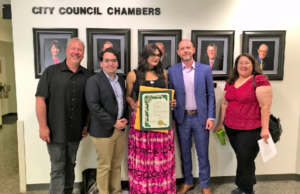
LGBTQ+ Organizations
Indivisible Conejo was created in response to the election of Donald Trump in late 2016. “It was organized to bring people together for activism related to all sorts of issues on which we felt that Trump would threaten,” Jon Cummings, a co-founder of Indivisible Conejo (he/him), said. The organization is divided into teams focused on a variety of issues including LGBTQ+ rights, women’s rights, gun violence, immigration reform, reproductive rights and climate change.
Similarly, Unity Conejo is a grassroots organization founded by Megan Goebel, a CVUSD parent (she/her). Created in late September, the organization is a coalition of parents, students and teachers who are looking to implement change for LGBTQ+ students within the school district.
Goebel has two daughters, ages nine and six, the younger of whom is transgender. This served as her motivation for founding the organization. “I knew that I was going to be with the district a long time and needed to really pave the path for her and the kiddos that come after her,” Goebel said. “And in doing so, we found that there were a lot of areas that we needed to improve, not only just from an inclusivity standpoint, but also from a curriculum standpoint.”
Both organizations are advocating for the implementation of LGBTQ+ inclusive education. “There are people in our community who are trying to stop that instruction from happening, to limit it to suit their ideological and religious desires,” Cummings said. “We’re going to be pushing for an open and honest curriculum that gets kids ready for the reality of 21st-century life.”
Stephanie McCarver, another CVUSD mother and member of Unity Conejo (she/her), believes that educating students on LGBTQ+ topics is important for all students. “I think education is key because when someone is educated, they’re less likely to be intolerant or buy into homophobic myths or misogynistic myths,” McCarver said.
Unity Conejo has also been pushing for a more inclusive sex education curriculum and its implementation for younger ages. However, there are a lot of misconceptions regarding this, and Goebel wants to make the content of the intended programs clear. “It’s really not about…trying to teach these…kiddos about sex or anything of that nature. It’s more about just trying to…help give that foundation for these kiddos that it’s okay to be different,” Goebel said.
Celia Daniels (she/her) is a member of Indivisible Conejo and a well-known trans activist within Ventura County. As well as being the team lead for the LGBTQ+ Indivisible branch, she is an executive director of the Trans Can Work project and the vice president of Stonewall Democrats of Ventura County.
Indivisible has lead and participated in several events since its creation, including conducting panels at local colleges and workplaces, discussing a more inclusive curriculum, meeting with government officials and holding events to honor queer individuals and history.
While the committee is centralized around LGBTQ+ issues, Daniels points out that these issues are often interwoven with other social justice issues. “What I believe, as a trans person…it is not all about LGBTQ+ issues. It’s the issue of the community, it’s intersectional,” Daniels said. “So, like gun violence, all the community came together fighting for those issues. So some of them may not be exactly LGBTQ-related, but what we want to do is educate the community.”
Whether you are a member of the LGBTQ+ community or an ally, there are so many opportunities to get more involved in activism at the local level, beginning with becoming familiar with local organizations. “Just being a part of these groups…you receive all this information and you can participate in all these events,” Daniels said. Refer to the boxes above to see which opportunities apply to you.
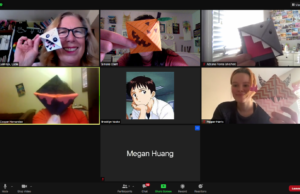
Gay Straight Alliance
The Gay-Straight Alliance (GSA) is a club that provides a safe space for the LGBTQ+ student community to come together and support one another. They hold meetings every Wednesday at 2:30 pm to 3:30pm.
Lindsay Freedman, freshman (she/her), is the secretary of GSA and identifies as queer. “I joined GSA because I think it’s super important to show gay-straight alliances. I think it’s a super good safe space for people that either aren’t ready to come out [or just] to show their support,” Freedman said. “A lot of people, especially straight people that aren’t part of the community, don’t necessarily realize there’s still a lot of problems going on. It’s really important to learn about it, and help others learn.”
A major issue that occurs at NPHS is that there is not enough awareness of the stigma around the LGBTQ+ community, but GSA is a great place to have an open dialogue to touch on sensitive topics. “Every week we talk about a different issue within the community…Last week, we talked about stigma around certain words, and how it’s not taught in schools. Some parents are like, ‘Oh, well, I don’t want my kid learning about that,’ even though it’s not like a bad thing or anything,” Freedman said. “It’s…a taboo topic. So we talked about…[how] we can encourage others to break down that stigma.”
GSA provides an essential learning environment. Megan Huang, sophomore (she/her), is the publicist of GSA and identifies as straight. “The wide range of people who identify as different parts of the spectrum has really helped me gain more knowledge on different sexualities within the spectrum…a lot of my friends are within the community. I want to learn more, so I could better help support them in any way possible,” Huang said. “Just by talking to [people who are within our group], I learned so much.”
Simone Elliot, senior (she/her), is the vice president of GSA and identifies as straight. She believes that the acceptance of LGBTQ+ students is critical on school sites. “The most important thing is to better establish [is that] the LGBTQ+ community is completely valid and should be accepted as [any] other person is…the community’s integration and normalization is crucial to its acceptance in school and especially society,” Elliot said.
In order for our community to become better, people need to be educated about what is happening in our society and what is happening within the LGBTQ+ community. “[People need to use] all the opportunities that [they’re] given. I get no one joining GSA because there’s a lot of stigma and also it is like a weekly commitment …If you’re given the opportunity to go to a rally… I would definitely say go because it’s a really good experience and it’s just really good to have it gives you good life skills,” Freedman said.

